Final Report
Yuki's Final Report
Improving Education for the Deaf People of Sri Lanka
Self introduction
I was born in Funabashi, Chiba, Japan, and stayed in Japan until 4. Born deaf, I went to a toddler and infant class of the Special Needs Education School for the Deaf, University of Tsukuba with my mother.
Right now, I work for a deaf school in Sri Lanka as a teacher of English. I came to Japan because I wanted to learn about oral and sign language education at Japanese deaf schools, and new approaches for deaf education.
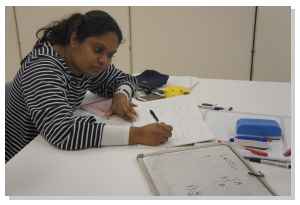
Studying Japanese and Japanese sign language
After arriving in September, I first studied Japanese and Japanese sign language. I got 78 out of 100 in grammar and 100 in kanji in the Japanese test in our last class. The hard work was worth it. It was great joy to study a new language.
During the language training period I attended the 52nd National Debate Meeting of Deaf Youth. It was three days of learning many new things. I was especially glad to learn about the Deaf-lympics as I knew nothing about it. I also attended a friendship meeting in the evening and talked to many people, which in turn improved my Japanese and Japanese sign language. It was fun to get in touch with many different cultures.
Homestay
From the end of the year to the New Year I stayed at the homes of Japanese families in Aichi and Mie. I did not get bored at all, as I could communicate with my host families in sign language. In Aichi, the family helped me prepare matcha tea, and cook takoyaki- savory Japanese pancake balls with bits of octopus in them. I had never done these things before, but my host family carefully taught me what to do. I was very happy when they said my matcha and takoyaki were both tasty.
I love crabs, and Mie is famous for crabs. When I was there, a crab festival was on, so I enjoyed many different types of crabs.
My host families were very kind. They taught me Japanese culture and lifestyles. They also took me to beautiful places after finding out that I love natural landscapes.
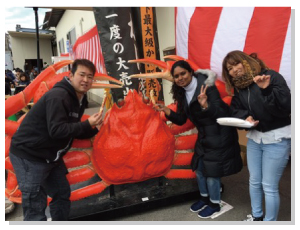
Individual training programs
1.Deaf schools
In Japan, I visited various deaf schools. When I was at one of these schools, I noticed that there were tennis balls attached to the legs of classroom desks and chairs. They had the effect of reducing the squeaking noise from the desks and chairs when they were moved. Some of the children at the school I work for, had hearing aids and cochlear implants on and said, “I get a headache from the noise of desks and chairs”. As I couldn’t hear the noise I couldn’t understand what they were talking about, but the visit helped me realize that tennis balls could reduce that noise. I would like to introduce this idea to my school after I go home.
2.Deaf children and communication
During the training period at the Osaka Association of the deaf, I had a chance to visit COMEKKO for two days. They were trying to communicate with each other in sign language, even with babies below age 1. I realized that learning sign language is not just essential for deaf children, but for their families. There are no such activities in Sri Lanka and deaf children have no means of communicating with their parents.
At Arton School and Day Service Center for Deaf Children Tokyo, I saw children aged 0-12 communicating in sign language. In the morning, toddlers and infants came in with their parents. The teachers were reading picture books to them in sign language. It was an approach that hadn’t been introduced to Sri Lanka. So, I tried my hand at reading a picture book to the children. In the afternoon, the school holds after-school activities and other day service activities for children coming in after school. As I was not so good at Japanese, I helped their English and math homework and taught them games from Sri Lanka. I had a lot of interactions with the children. The two weeks at Arton was so fun. On my last day, the staff and children at Arton gave me a big card with their personal messages. It brought tears to my eyes as I felt overwhelmingly happy.
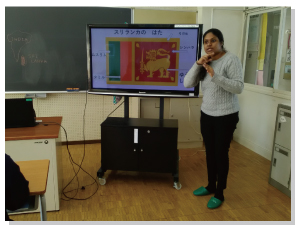
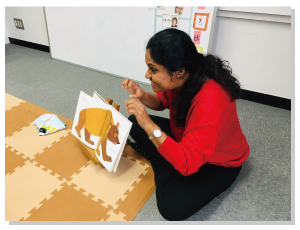
Happy moments
On this visit to Japan, I had an unexpected encounter with my childhood. This man had apparently seen me going to the infant and toddler class, hand in hand with my mother when I was living in Japan before. He was a high school student back then and I was too young to remember him then, but I was so happy to see him again.
I also saw real tulips for the first time in Japan. I love tulips but had only seen them on TV because there are no tulips in Sri Lanka. It was incredibly touching to see rows of tulips in Tachikawa.
My learnings in Japan
I learned many things in Japan and understood the following.
- There are many instruction methods for deaf education (the important thing is to give instructions in the way that suits each deaf child)
- It is essential to start communicating in sign language from age 0
- Families of deaf children also need to learn sign language
- Reading picture books in sign language has great educational results
My activities after going home
・Further support to deaf education
I would like to go back to my job at the deaf school in Sri Lanka and improve the quality of education for the deaf, building on what I learned in Japan.
・Going to postgraduate school
In Sri Lanka, people think it is wasteful for deaf people to study. I would like to prove them wrong and show that deaf people can study.
・Supporting the deaf community in Colombo
Deaf people in Japan live independently. The situation is different in Sri Lanka. I would like to engage in activities to change this situation. I would also like to support elderly deaf people.
・Co-working, transcending different disabilities
This training helped me understand more about people who may not be deaf but have different disabilities. It is my hope that in Sri Lanka too, people with disabilities can work together just like in Japan, even if their disability types are different.
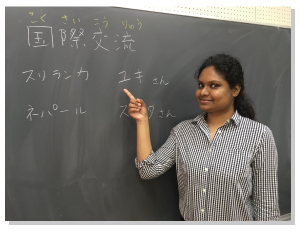
Words of thank you
My special thanks go to Ms. Nasu for looking after me so kindly when I was sick. I would like to thank my colleagues Ms. Sunita, Mr. Yonten, Mr. Myo Min and Mr. Su Nan. Thank you very much. My thanks also go to the cleaning staff of the Toyama Sunrise, the place I stayed at when I was Tokyo. I would like to express my sincere thanks to my teachers and the people I met during my individual training programs and my group training programs, and my host families, the staff members of the Duskin AINOWA Foundation and the JSRPD, as well as other people I met during my stay in Japan. Thank you so much.
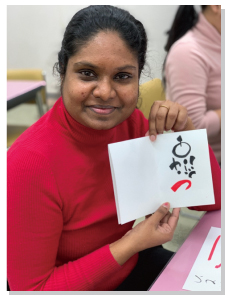
Lastly..
Last but not least, I would like to mention that I had tried to get selected for the Duskin leadership training program three times, and in my final attempt I was fortunate to get selected for Sri Lanka. So, let me conclude my beautiful memories on the Duskin Leadership Training program with my favorite quote "Try and Try, One Day You 'll Fly.




